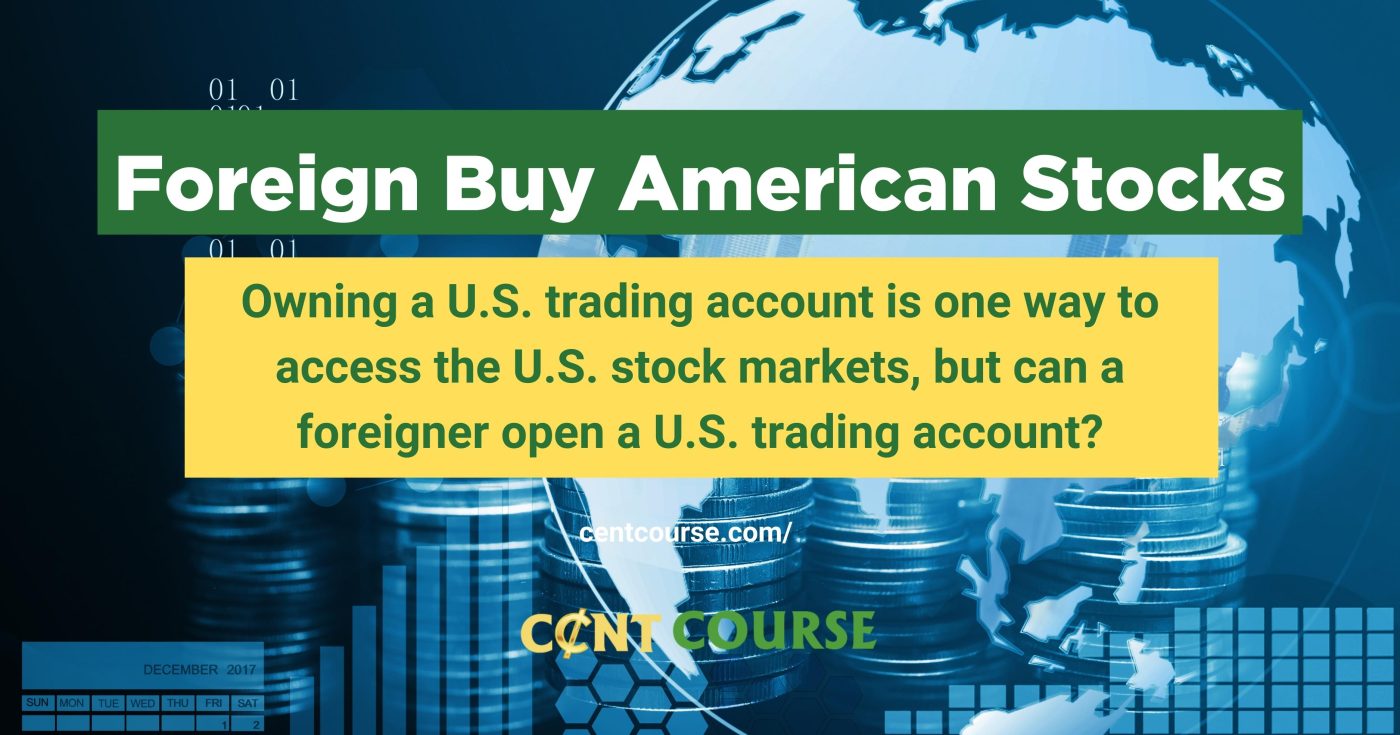Blog
How Does a Foreign Buy American Stocks?
Many investors want to invest in the United States stock market since it is the biggest in the world. Owning a U.S. trading account is one way to access the U.S. stock markets, but can a foreigner open a U.S. trading account? And How does a foreign buy American stocks?
How to Invest in the US stock market from another country
Identify requirements for Non-U.S. Citizens
To prevent anyone associated with terrorism from accessing the American capital markets to support their illegal actions was one of the goals of the Patriot Act of 2001, which was passed in the wake of the 9/11 terrorist attacks. Due to the act, brokerage firms now follow stricter criteria for verifying the identity of customers, particularly those who are not U.S. citizens.
A clause in this statute also requires stockbrokers to alert the American government to any suspicious account activity. However, since the vast majority of foreign investors have no connections to organized crime, it is evident that they are unaffected by these regulations.
Some brokerage firms may require non-U.S. citizens to produce additional types of identification documents in order to comply with their individual policies. This can include visa information, a valid Social Security number, or a Certificate of Status of Beneficial Owner for United States Tax Withholding and Reporting form (also called a W-8BEN).
How to Open a Trading Account in the US
You can invest in the US stock market under the RBI’s Liberalized Remittance Scheme or LRS. The scheme allows every person to remit up to $250,000 per year. This limit is per individual, including minors, which means that a family of 4 can remit up to USD 1 million per financial year. This quota includes any investment like US securities, real estate, bank deposits, etc., and all overseas expenses like foreign travel and student education.

Investors who are new to the American market can get management assistance from an international stockbroker. Brokerage companies can assist in making sure that your investments are legal. A broker based in the United States will also be knowledgeable about navigating the complexities of the American stock market. Some brokerage companies especially specialize in assisting foreign investors.
Researching whether or whether the brokerage firm allows investors from their particular nation is essential for non-U.S. investors, as some companies have regional restrictions. The good news is that a lot of brokerage houses keep online sites for investors to check on their money whenever they want, from wherever they are.
Make sure you have your foreign passport and a recent utility bill on hand because you may be asked to show these as confirmation of your identification and nonresident status.
To fill out the required forms, visit the broker’s website and click the “open account” link. You must print out some of the forms because they may need to be signed. You must complete and sign the W-8BEN form as a foreigner. It is a crucial document that demonstrates your foreign residency status in relation to income taxes.
Once the paperwork has been completed and signed, scan them, attach a scanned copy of your passport, and email or upload them to the broker. The broker will then evaluate your application and give you an email letting you know if it was successful or not.
You can deposit money into your trading account if your application is approved. You must already be aware of the ways of money transfers that your broker accepts, such as wire transfers, PayPal payments, ACH transfers, etc. Choose a strategy that works for you.
U.S. Brokerages for Non-U.S. Citizens
Foreigners can open accounts with some internet brokers. After extensive investigation, we discovered that Firstrade offered all we needed!
They provide free trading of stocks, ETFs, options, and mutual funds, which is a significant bonus because, if you’re not careful, the commission might potentially eat into your profits!
Here are some options for you:
- TD Ameritrade (over 100 countries)
- Interactive Brokers (220 countries)
- Charles Schwab International (over 100 countries with a $25,000 minimum deposit)
- JPMorgan Chase (only if you actually live in the United States)
- Zacks Trade (over 200 countries)
How Much Can I Invest in US stocks?
Under the LRS, or Liberalized Remittance Scheme, of the RBI, you are able to invest in the US stock market. Each participant in the program may contribute up to $250,000 annually. This cap is per person, including minors, thus a family of four can send up to USD $1 million in one fiscal year. This cap covers all costs abroad, such as international travel and higher education, as well as investments like US equities, real estate, bank accounts, etc.
Dividend Income Tax and Capital Gains
If you are not a US citizen, trading US investments have tax repercussions. For tax purposes, investors who are considered non-resident foreign nationals of the US are exempt from paying capital gains tax on the profits from their investments. This means that no taxes will be deducted from account earnings by the brokerage company. On the other hand, several other nations require a capital gains tax on income made in overseas markets. Investors may be responsible for those taxes in the nations where they reside or are tax residents.

If you invest in a firm that pays dividends and you are a non-resident foreign national, the tips are typically taxed as income at a flat rate of 30%. This regulation has a few exceptions, such as where the investor’s country of residence is a party to a treaty with the US that permits a lower tax rate. Similarly to this, if dividend profits are tied to interest, confident investors may qualify for a lower tax rate.
The fact that some types of U.S. assets are liable to U.S. estate and gift taxation on behalf of non-residents must be kept in mind. These taxes have a top tax rate of 40% and a $60,000 exemption that is only available for transfers upon death.
Due to the complexity of international tax laws, it may be prudent for a non-U.S. investor to deal with a global broker who is informed of the tax repercussions of investing in other markets.
A U.S. citizen is not required to trade on the American stock market. Even as a foreigner, you can open an online trading account with a U.S. broker, but more paperwork is required. The local financial institutions that have access to the American stock market are an alternative. You should also familiarize yourself with the pertinent tax laws.

